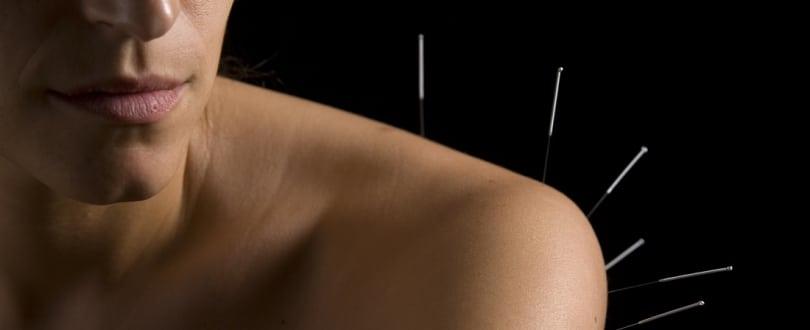
Acupuncture – What is it?
Acupuncture is a method that empowers the body to improve its healing powers and general functional state. This is done by placing needles in very specific acupuncture points. The classical Chinese explanation is that energy channels (meridians) flow within the body and on its surface. They are like rivers that run through the body watering and nourishing the tissues. An interruption in the movement of these energy rivers is like a dam that floods the other tissues. Meridians can be affected by needling acupuncture points. Acupuncture needles unblock blockages and restore smooth flow through the meridians. Acupuncture treatments can thus help the body's organs with dysfunctions of digestion, assimilation and energy production.
The modern scientific view is that by needling acupuncture points we stimulate the nervous system to release chemicals in the muscles, spine and brain. These chemicals will either reduce the sensation of pain or cause the release of other chemicals and hormones that affect the body's own internal self-regulatory system.
The improved energy and biochemical balance of the body caused by acupuncture has the effect of stimulating the body's natural healing abilities and promoting physical and mental well-being.
What is Medical Acupuncture? Is it different from regular Acupuncture?
Acupuncture is a very old medical art and there are many approaches to learning and applying it. Medical Acupuncture is the term used to describe acupuncture practiced by a physician trained and certified in Western Medicine who is also thoroughly trained in Acupuncture as another specialty. Such a physician may use one or the other approach or a combination of the two as the need to treat a disease arises.
What is the purpose of Medical Acupuncture?
Medical Acupuncture is a system that can affect three areas in health care:
- promoting health and wellness
- disease prevention
- treatment of various pathological conditions.
Although acupuncture is often used for pain control, in the hands of a well-trained practitioner it has wider applications.
Acupuncture can be effective as a treatment on its own or as a support and adjunct to other medical treatments for many medical conditions.
The World Health Organization recognizes the use of acupuncture in the treatment of a wide range of medical problems including:
- digestive disorders: gastritis and hypersecretion of gastric fluid, spastic colitis, constipation, diarrhea.
- respiratory disorders: sinusitis, bronchitis, asthma, recurrent respiratory infections.
- neurological and muscular disorders: headache, facial tics, cervical syndrome, shoulder periarthritis, elbow arthritis, various forms of tendinitis, lumbago, sciatica, osteoarthritis.
- urological, menstrual and reproductive problems.
Acupuncture is particularly useful in solving problems related to anxiety, stress and psychological disorders.
How many treatments will I need?
The number varies from person to person. For complicated or chronic conditions we may recommend one or two sessions per week for several weeks. For acute conditions fewer treatments are needed.
Are there any side effects from the treatment?
Usually not. As the energy is redirected within the body, chemicals and hormones are released and the healing process begins. Sometimes the initial symptoms worsen for a few days, or other general changes in appetite, sleep, bowel movements, urination, or psychological status may be triggered. These should not cause concern as they are simply signs that the acupuncture is starting to work. It is quite common with the first or second treatment to have a feeling of deep relaxation or even sleepiness immediately after the treatment. This passes in a short time and never needs more than a little rest to pass.
How are the needles? Do they hurt?
People experience acupuncture differently. Most people feel little or no pain when the needle is inserted. Once the needle is in place there is no pain sensation. The needles are very thin and solid made of steel and as they are single use there is no risk of contamination.
Does acupuncture really work?
Yes. In the past 2000 years more people have been successfully treated with acupuncture than with all other healing methods. Acupuncture can be applied in conjunction with any formal medical treatment.
Do I need to believe in acupuncture for it to work?
No. Acupuncture is used successfully on cats, dogs, horses and other animals. These animal patients do not understand or believe in the method that makes them well. A positive attitude towards health can enhance the effect of treatment, just as a negative attitude can hinder the results of acupuncture or any other treatment. A neutral attitude ("I don't know if I believe in this") will not block the effects of the treatment.
Are there things I should or shouldn't do on the day of treatment?
Yes. To increase the value of the treatment the following guidelines are important
- Do not eat an unusually large meal before or after acupuncture.
- Do not exercise excessively, have sex, or drink alcohol six hours before or after acupuncture.
- Make your schedule so that after acupuncture you have some rest time or at least not working at full speed. This is especially important on first visits.
- Continue to take the medicines your doctor gave you.
- Substance or alcohol use especially in the week before treatment interacts negatively with treatment effectiveness.
- Remember to keep verbal or written notes of how you respond to treatment. This is important for your doctor to plan the next treatments in the best way.
source: http://www.iatro.gr/

No Comments